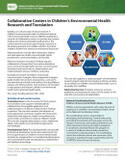The NIEHS Collaborative Centers in Children’s Environmental Health Research and Translation (CEHRT) program supports a network of centers that bring together experts from fields such as the environmental health sciences, communication, behavioral and social sciences, dissemination and implementation science, medicine, and policy.
These multidisciplinary collaborations facilitate the translation of children’s environmental health (CEH) research findings into tools and approaches that can help protect and improve children’s health. Examples of research translation may include communication strategies, public health interventions, educational activities and toolkits, clinical guidelines, and other products.
The centers share the common goal of being a resource for researchers, federal and state agencies, health care professionals, and community members in developing practical and scalable solutions to protect children’s health.
Core activities of the network involve:
Fact Sheets
Collaborative Centers in Children's Environmental Health Research and Translation
- Translation Core: Facilitates multidisciplinary collaborations with a focus on developing strategies to move CEH research findings into practice. The core also supports a pilot project program to test, implement, adapt and evaluate new CEH research translational products.
- Developmental Core: Supports a mentorship program for early-stage CEH investigators. This core also supports pilot projects that address emerging CEH issues.
- Administrative Core: Prioritizes center resources, accesses guidelines, and evaluates the impact of center and program activities.
- Coordinating Center: Manages activities across the entire program. This center is responsible for developing and maintaining a central web portal, promoting program activities, and hosting conferences and other interactions among principal investigators.



